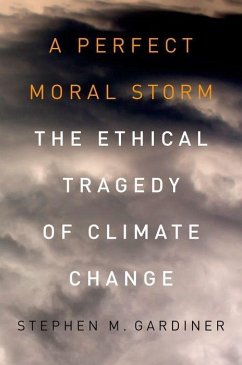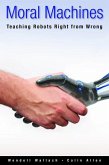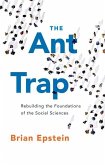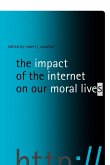Stephen M. Gardiner (Associate Professor, Associate Professor, Depa
A Perfect Moral Storm
The Ethical Tragedy of Climate Change
Stephen M. Gardiner (Associate Professor, Associate Professor, Depa
A Perfect Moral Storm
The Ethical Tragedy of Climate Change
- Broschiertes Buch
- Merkliste
- Auf die Merkliste
- Bewerten Bewerten
- Teilen
- Produkt teilen
- Produkterinnerung
- Produkterinnerung
Climate change is arguably the great problem confronting humanity, but we have done little to head off this looming disaster. In The Perfect Moral Storm, Stephen Gardiner illuminates our dangerous inaction by placing the environmental crisis in an entirely new light, considering it as an ethical failure.
Andere Kunden interessierten sich auch für
![Tainted Tainted]() Kristin Shrader-Frechette (O'Neill Family O'Neill Family ProfessorTainted49,99 €
Kristin Shrader-Frechette (O'Neill Family O'Neill Family ProfessorTainted49,99 €![Moral Machines Moral Machines]() Wendell WallachMoral Machines26,99 €
Wendell WallachMoral Machines26,99 €![Technology and the Virtues Technology and the Virtues]() Shannon Vallor (S.J S.J. Professor in the Department of PhilosophyTechnology and the Virtues95,99 €
Shannon Vallor (S.J S.J. Professor in the Department of PhilosophyTechnology and the Virtues95,99 €![Technology and the Virtues Technology and the Virtues]() Shannon Vallor (S.J S.J. Professor in the Department of PhilosophyTechnology and the Virtues36,99 €
Shannon Vallor (S.J S.J. Professor in the Department of PhilosophyTechnology and the Virtues36,99 €![Ant Trap Ant Trap]() Brian Epstein (Associate Profess Associate Professor of PhilosophyAnt Trap39,99 €
Brian Epstein (Associate Profess Associate Professor of PhilosophyAnt Trap39,99 €![Setting the Moral Compass Setting the Moral Compass]() Cheshire Calhoun (ed.)Setting the Moral Compass77,99 €
Cheshire Calhoun (ed.)Setting the Moral Compass77,99 €![The Impact of the Internet on Our Moral Lives The Impact of the Internet on Our Moral Lives]() The Impact of the Internet on Our Moral Lives40,99 €
The Impact of the Internet on Our Moral Lives40,99 €-
-
-
Climate change is arguably the great problem confronting humanity, but we have done little to head off this looming disaster. In The Perfect Moral Storm, Stephen Gardiner illuminates our dangerous inaction by placing the environmental crisis in an entirely new light, considering it as an ethical failure.
Hinweis: Dieser Artikel kann nur an eine deutsche Lieferadresse ausgeliefert werden.
Hinweis: Dieser Artikel kann nur an eine deutsche Lieferadresse ausgeliefert werden.
Produktdetails
- Produktdetails
- Environmental Ethics and Science Policy Series
- Verlag: Oxford University Press Inc
- Seitenzahl: 518
- Erscheinungstermin: 1. März 2013
- Englisch
- Abmessung: 234mm x 156mm x 28mm
- Gewicht: 794g
- ISBN-13: 9780199985142
- ISBN-10: 0199985146
- Artikelnr.: 39395468
- Herstellerkennzeichnung
- Libri GmbH
- Europaallee 1
- 36244 Bad Hersfeld
- gpsr@libri.de
- Environmental Ethics and Science Policy Series
- Verlag: Oxford University Press Inc
- Seitenzahl: 518
- Erscheinungstermin: 1. März 2013
- Englisch
- Abmessung: 234mm x 156mm x 28mm
- Gewicht: 794g
- ISBN-13: 9780199985142
- ISBN-10: 0199985146
- Artikelnr.: 39395468
- Herstellerkennzeichnung
- Libri GmbH
- Europaallee 1
- 36244 Bad Hersfeld
- gpsr@libri.de
Stephen M. Gardiner is Professor of Philosophy and Ben Rabinowitz Endowed Professor of Human Dimensions of the Environment at the University of Washington, Seattle. He is the coordinating co-editor of Climate Ethics: Essential Readings (Oxford, 2010), and the editor of Virtue Ethics: Old and New (Cornell, 2005). He is currently co-editing the Oxford Handbook on Environmental Ethics with Allen Thompson.
Contents
Preface
Acknowledgements
Introduction: A Global Environmental Tragedy
I. Some Assumptions
II. Introducing the Perfect Storm Metaphor
III. Climate Change
IV. The Wider Relevance of the Model
V. Outline of the Book
Part A: Overview
Chapter 1: A Perfect Moral Storm
I. Why Ethics?
II. The Global Storm
III. The Intergenerational Storm
IV. The Theoretical Storm
V. The Problem of Moral Corruption
Chapter 2: A Consumption Tragedy
I. What is the Point of Game Theory?
II. Motivating the Models
III. A Green Energy Revolution?
IV. Consumption and Happiness
Part B: The Global Storm
Chapter 3: Somebody Else's Problem
I. Past Climate Policy
II. Somebody Else's Burden
III. Against Optimism
IV. Conclusion
Chapter 4: In the Shadow of a Common Tragedy
I. Climate Prisoners?
II. An Evolving Tragedy
III. Beyond Pessimism
IV. Lingering Tragedy
V. Climate Policy in the Shadows
VI. Conclusion
Part C: The Intergenerational Storm
Chapter 5: The Tyranny of the Contemporary
I. Problems with 'Generations'
II. Intergenerational Buck-Passing
III. Intergenerational Buck-Passing vs. The Prisoners' Dilemma
IV. The Features of the Pure Intergenerational Problem
V. Applications and Complications
VI. Mitigating Factors
VII. The Non-Identity Problem: A Quick Aside
VIII. Conclusion
Chapter 6: An Intergenerational Arms Race?
I. Abrupt Climate Change
II. Three Causes of Political Inertia
III. Against Undermining
IV. Conclusion
Part D: The Theoretical Storm
Chapter 7: A Global Test for Political Institutions and Theories
I. The Global Test
II. Scenarios
III. A Conjecture
IV. Theoretical Vices
V. An Illustration: Utilitarianism
VI. Understanding the Complaint
VII. Conclusion
Chapter 8: Cost-Benefit Paralysis
I. Cost-Benefit Analysis in Normal Contexts
II. CBA for Climate Change
III. The Presumption Against Discounting
IV. The Basic Economics of the Discount Rate
V. Discounting the Rich?
VI. Declining Discount Rates
VII. Two Objections to "Not Discounting"
VIII. The "Devil's in the Details" Argument
IX. Conclusions
Part E: Moral Corruption
Chapter 9: Jane Austen vs. Climate Economics
I. Corruption
II. The Dubious Dashwoods: Initial Parallels
III. The Opening Assault on the Status of the Moral Claim
IV. The Assault on Content
V. Indirect Attacks
VI. The Moral of the Story
Chapter 10: Geoengineering in an Atmosphere of Evil
I. An Idea that is Changing the World
II. The Problem of Political Inertia Revisited
III. Two Preliminary Arguments: Cost and "Research First"?
IV. Arming the Future
V. Arm the Present?
VI. Evolving Shadows
VII. Underestimating 'Evil'
VIII. An Atmosphere of Evil?
IX. "But... Should We Do It?"
Part F: What Now?
Conclusion: The Immediate Future
Postscript: Some Initial Ethics of the Transition
I. Introduction
II. The Ethics of Skepticism
III. Past Emissions
IV. Future Emissions
V. Responsibility
VI. Ideal Theory
VII. Conclusion
Appendices
Appendix 1: The Population Tragedy
I. Hardin's Analysis
II. Population as a Tragedy of the Commons
III. Total Environmental Impact
IV. Conclusion
Appendix 2: Epistemic Corruption and Scientific Uncertainty in
Michael Crichton's State of Fear
I. What the Scientists Know
II. Certainty, Guesswork and the Missing Middle
III. Conclusion
Preface
Acknowledgements
Introduction: A Global Environmental Tragedy
I. Some Assumptions
II. Introducing the Perfect Storm Metaphor
III. Climate Change
IV. The Wider Relevance of the Model
V. Outline of the Book
Part A: Overview
Chapter 1: A Perfect Moral Storm
I. Why Ethics?
II. The Global Storm
III. The Intergenerational Storm
IV. The Theoretical Storm
V. The Problem of Moral Corruption
Chapter 2: A Consumption Tragedy
I. What is the Point of Game Theory?
II. Motivating the Models
III. A Green Energy Revolution?
IV. Consumption and Happiness
Part B: The Global Storm
Chapter 3: Somebody Else's Problem
I. Past Climate Policy
II. Somebody Else's Burden
III. Against Optimism
IV. Conclusion
Chapter 4: In the Shadow of a Common Tragedy
I. Climate Prisoners?
II. An Evolving Tragedy
III. Beyond Pessimism
IV. Lingering Tragedy
V. Climate Policy in the Shadows
VI. Conclusion
Part C: The Intergenerational Storm
Chapter 5: The Tyranny of the Contemporary
I. Problems with 'Generations'
II. Intergenerational Buck-Passing
III. Intergenerational Buck-Passing vs. The Prisoners' Dilemma
IV. The Features of the Pure Intergenerational Problem
V. Applications and Complications
VI. Mitigating Factors
VII. The Non-Identity Problem: A Quick Aside
VIII. Conclusion
Chapter 6: An Intergenerational Arms Race?
I. Abrupt Climate Change
II. Three Causes of Political Inertia
III. Against Undermining
IV. Conclusion
Part D: The Theoretical Storm
Chapter 7: A Global Test for Political Institutions and Theories
I. The Global Test
II. Scenarios
III. A Conjecture
IV. Theoretical Vices
V. An Illustration: Utilitarianism
VI. Understanding the Complaint
VII. Conclusion
Chapter 8: Cost-Benefit Paralysis
I. Cost-Benefit Analysis in Normal Contexts
II. CBA for Climate Change
III. The Presumption Against Discounting
IV. The Basic Economics of the Discount Rate
V. Discounting the Rich?
VI. Declining Discount Rates
VII. Two Objections to "Not Discounting"
VIII. The "Devil's in the Details" Argument
IX. Conclusions
Part E: Moral Corruption
Chapter 9: Jane Austen vs. Climate Economics
I. Corruption
II. The Dubious Dashwoods: Initial Parallels
III. The Opening Assault on the Status of the Moral Claim
IV. The Assault on Content
V. Indirect Attacks
VI. The Moral of the Story
Chapter 10: Geoengineering in an Atmosphere of Evil
I. An Idea that is Changing the World
II. The Problem of Political Inertia Revisited
III. Two Preliminary Arguments: Cost and "Research First"?
IV. Arming the Future
V. Arm the Present?
VI. Evolving Shadows
VII. Underestimating 'Evil'
VIII. An Atmosphere of Evil?
IX. "But... Should We Do It?"
Part F: What Now?
Conclusion: The Immediate Future
Postscript: Some Initial Ethics of the Transition
I. Introduction
II. The Ethics of Skepticism
III. Past Emissions
IV. Future Emissions
V. Responsibility
VI. Ideal Theory
VII. Conclusion
Appendices
Appendix 1: The Population Tragedy
I. Hardin's Analysis
II. Population as a Tragedy of the Commons
III. Total Environmental Impact
IV. Conclusion
Appendix 2: Epistemic Corruption and Scientific Uncertainty in
Michael Crichton's State of Fear
I. What the Scientists Know
II. Certainty, Guesswork and the Missing Middle
III. Conclusion
Contents
Preface
Acknowledgements
Introduction: A Global Environmental Tragedy
I. Some Assumptions
II. Introducing the Perfect Storm Metaphor
III. Climate Change
IV. The Wider Relevance of the Model
V. Outline of the Book
Part A: Overview
Chapter 1: A Perfect Moral Storm
I. Why Ethics?
II. The Global Storm
III. The Intergenerational Storm
IV. The Theoretical Storm
V. The Problem of Moral Corruption
Chapter 2: A Consumption Tragedy
I. What is the Point of Game Theory?
II. Motivating the Models
III. A Green Energy Revolution?
IV. Consumption and Happiness
Part B: The Global Storm
Chapter 3: Somebody Else's Problem
I. Past Climate Policy
II. Somebody Else's Burden
III. Against Optimism
IV. Conclusion
Chapter 4: In the Shadow of a Common Tragedy
I. Climate Prisoners?
II. An Evolving Tragedy
III. Beyond Pessimism
IV. Lingering Tragedy
V. Climate Policy in the Shadows
VI. Conclusion
Part C: The Intergenerational Storm
Chapter 5: The Tyranny of the Contemporary
I. Problems with 'Generations'
II. Intergenerational Buck-Passing
III. Intergenerational Buck-Passing vs. The Prisoners' Dilemma
IV. The Features of the Pure Intergenerational Problem
V. Applications and Complications
VI. Mitigating Factors
VII. The Non-Identity Problem: A Quick Aside
VIII. Conclusion
Chapter 6: An Intergenerational Arms Race?
I. Abrupt Climate Change
II. Three Causes of Political Inertia
III. Against Undermining
IV. Conclusion
Part D: The Theoretical Storm
Chapter 7: A Global Test for Political Institutions and Theories
I. The Global Test
II. Scenarios
III. A Conjecture
IV. Theoretical Vices
V. An Illustration: Utilitarianism
VI. Understanding the Complaint
VII. Conclusion
Chapter 8: Cost-Benefit Paralysis
I. Cost-Benefit Analysis in Normal Contexts
II. CBA for Climate Change
III. The Presumption Against Discounting
IV. The Basic Economics of the Discount Rate
V. Discounting the Rich?
VI. Declining Discount Rates
VII. Two Objections to "Not Discounting"
VIII. The "Devil's in the Details" Argument
IX. Conclusions
Part E: Moral Corruption
Chapter 9: Jane Austen vs. Climate Economics
I. Corruption
II. The Dubious Dashwoods: Initial Parallels
III. The Opening Assault on the Status of the Moral Claim
IV. The Assault on Content
V. Indirect Attacks
VI. The Moral of the Story
Chapter 10: Geoengineering in an Atmosphere of Evil
I. An Idea that is Changing the World
II. The Problem of Political Inertia Revisited
III. Two Preliminary Arguments: Cost and "Research First"?
IV. Arming the Future
V. Arm the Present?
VI. Evolving Shadows
VII. Underestimating 'Evil'
VIII. An Atmosphere of Evil?
IX. "But... Should We Do It?"
Part F: What Now?
Conclusion: The Immediate Future
Postscript: Some Initial Ethics of the Transition
I. Introduction
II. The Ethics of Skepticism
III. Past Emissions
IV. Future Emissions
V. Responsibility
VI. Ideal Theory
VII. Conclusion
Appendices
Appendix 1: The Population Tragedy
I. Hardin's Analysis
II. Population as a Tragedy of the Commons
III. Total Environmental Impact
IV. Conclusion
Appendix 2: Epistemic Corruption and Scientific Uncertainty in
Michael Crichton's State of Fear
I. What the Scientists Know
II. Certainty, Guesswork and the Missing Middle
III. Conclusion
Preface
Acknowledgements
Introduction: A Global Environmental Tragedy
I. Some Assumptions
II. Introducing the Perfect Storm Metaphor
III. Climate Change
IV. The Wider Relevance of the Model
V. Outline of the Book
Part A: Overview
Chapter 1: A Perfect Moral Storm
I. Why Ethics?
II. The Global Storm
III. The Intergenerational Storm
IV. The Theoretical Storm
V. The Problem of Moral Corruption
Chapter 2: A Consumption Tragedy
I. What is the Point of Game Theory?
II. Motivating the Models
III. A Green Energy Revolution?
IV. Consumption and Happiness
Part B: The Global Storm
Chapter 3: Somebody Else's Problem
I. Past Climate Policy
II. Somebody Else's Burden
III. Against Optimism
IV. Conclusion
Chapter 4: In the Shadow of a Common Tragedy
I. Climate Prisoners?
II. An Evolving Tragedy
III. Beyond Pessimism
IV. Lingering Tragedy
V. Climate Policy in the Shadows
VI. Conclusion
Part C: The Intergenerational Storm
Chapter 5: The Tyranny of the Contemporary
I. Problems with 'Generations'
II. Intergenerational Buck-Passing
III. Intergenerational Buck-Passing vs. The Prisoners' Dilemma
IV. The Features of the Pure Intergenerational Problem
V. Applications and Complications
VI. Mitigating Factors
VII. The Non-Identity Problem: A Quick Aside
VIII. Conclusion
Chapter 6: An Intergenerational Arms Race?
I. Abrupt Climate Change
II. Three Causes of Political Inertia
III. Against Undermining
IV. Conclusion
Part D: The Theoretical Storm
Chapter 7: A Global Test for Political Institutions and Theories
I. The Global Test
II. Scenarios
III. A Conjecture
IV. Theoretical Vices
V. An Illustration: Utilitarianism
VI. Understanding the Complaint
VII. Conclusion
Chapter 8: Cost-Benefit Paralysis
I. Cost-Benefit Analysis in Normal Contexts
II. CBA for Climate Change
III. The Presumption Against Discounting
IV. The Basic Economics of the Discount Rate
V. Discounting the Rich?
VI. Declining Discount Rates
VII. Two Objections to "Not Discounting"
VIII. The "Devil's in the Details" Argument
IX. Conclusions
Part E: Moral Corruption
Chapter 9: Jane Austen vs. Climate Economics
I. Corruption
II. The Dubious Dashwoods: Initial Parallels
III. The Opening Assault on the Status of the Moral Claim
IV. The Assault on Content
V. Indirect Attacks
VI. The Moral of the Story
Chapter 10: Geoengineering in an Atmosphere of Evil
I. An Idea that is Changing the World
II. The Problem of Political Inertia Revisited
III. Two Preliminary Arguments: Cost and "Research First"?
IV. Arming the Future
V. Arm the Present?
VI. Evolving Shadows
VII. Underestimating 'Evil'
VIII. An Atmosphere of Evil?
IX. "But... Should We Do It?"
Part F: What Now?
Conclusion: The Immediate Future
Postscript: Some Initial Ethics of the Transition
I. Introduction
II. The Ethics of Skepticism
III. Past Emissions
IV. Future Emissions
V. Responsibility
VI. Ideal Theory
VII. Conclusion
Appendices
Appendix 1: The Population Tragedy
I. Hardin's Analysis
II. Population as a Tragedy of the Commons
III. Total Environmental Impact
IV. Conclusion
Appendix 2: Epistemic Corruption and Scientific Uncertainty in
Michael Crichton's State of Fear
I. What the Scientists Know
II. Certainty, Guesswork and the Missing Middle
III. Conclusion








